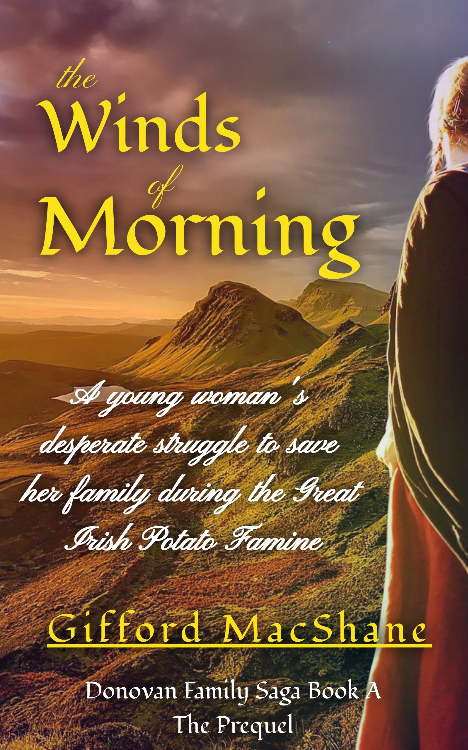Interview with Gifford MacShane
Author of The Winds of Morning
I'm the author of historical fiction that celebrates the resilience of the human spirit. My novels feature a family of Irish immigrants who settle in the Arizona Territory. My characters always have hidden flaws and strengths that I draw on as they grapple with physical and emotional conflicts.
Singing almost before I could talk, I've always loved folk music, whether Irish, Appalachian, or the songs of cowboys. My love of the Old West goes back to childhood, when my father introduced me to Zane Grey. Later, I became interested in Irish history after realizing his ancestors (who emigrated to the US in the late 1800s) had lived through the Great Potato Famine. I've combined these three interests into a series of romances, each with traditional song lyrics and a dash of Celtic mysticism.
The DONOVAN FAMILY SAGA includes WHISPERS IN THE CANYON (Book 1), THE WOODSMAN’S ROSE (Book 2), RAINBOW MAN (Book 3), and THE WINDS OF MORNING, a prequel novella requested by my fans.
I'm a member of the Historical Novel Society and an #OwnVoices writer. An avid gardener, I cultivate pollinator plants and grow tomatoes (not enough) and zucchini (too much). I love to sing, though my cats don’t always appreciate it. A grammar nerd who still gets a kick out of diagramming sentences, I currently live in Pennsylvania with my husband Richard, the Pied Piper of stray cats.
Buy this book
Quick description of the book for a new reader - what should they expect?
- The Great Potato Famine of the mid-1800s decimated Ireland, and this is the story of one young woman's struggle to keep what remained of her family alive.
What was your inspiration for this book?
- Several years ago, I saw an article about a memorial sculpture being installed in County Cork that celebrated the aid the Choctaw Tribe in America gave to the Irish during An Gorta Mor, the Great Irish Famine (An Gorta Mor). My mother has a smidgen of native blood, so the article caught my eye.
As I read it, I realized that my Irish ancestors had to have lived through that famine. I did some research and learned that it was a totally avoidable disaster, which cut Ireland’s population by at least a third while food was being exported to England at astronomical rates.
I felt compelled to tell the stories of the survivors—the ones who somehow held body and soul together and found a way to prosper.
What activities other than writing do you enjoy?
- Reading, of course. And watching classic black & white movies, especially anything starring Katherine Hepburn, Gregory Peck, or Vivien Leigh. I can’t pass up Lucille Ball in a dramatic role (check out The Dark Corner if you get a chance), but I don’t think much of slap-stick comedy or spoofs. And I come from a long line of New York Yankees fans—one of my earliest memories is sitting with my grandfather on his bed (he was disabled from black lung disease) watching Mickey Mantle on a black-and-white TV.
Did your family influence your work?
- Oh, absolutely. All my books include traditional songs, as I grew up in a large family, back when station wagons ruled the roads. There were no DVDs playing on the two-hour trips to see my grandparents, so we had to make our own fun. My father encouraged singing as it was the least physical activity—with 7 siblings crammed together, “Punch Bug” could soon become a fist-fight!
He taught us songs that were easy to remember and as a result, I’m addicted to traditional folk music, including Irish, American, Appalachian, cowboy songs, and African-American spirituals. I’m often singing or humming… anywhere, really, or any time… but if you were to ask me what the song is, I might not know. I might not even realize I was singing. There are many snippets of traditional music contained in my works: life without music would be just too hard to bear.
I’ve also been greatly influenced by my maternal grandfather. He was stricken with emphysema in his 40s, spent the last 20 years of his life confined to bed, but seldom complained and never stopped learning.
What advice would you give to aspiring authors?
- You need to blaze your own path. There are too many style rules out there: do this/don't do that. Only you know what your story needs.
That being said, things will go a lot smoother if you know the universal grammar rules, so you can break them deliberately and effectively.
Could you talk a little about your writing process? Plotter or Pantser?
- I call myself a “plantser”, which I think is the best combination of the two.
Pantser-me doesn’t create a detailed, chapter-by-chapter outline. But unlike authors who work without any formal plan at all, I begin each manuscript with a theme, a concrete idea of who the characters are, and what their conflict will be. This planning stage, which is mostly a matter of the “little gray cells” (to borrow from Dame Christie), can take weeks or even months of effort before I write a single word of the manuscript.
As far as plot is concerned, I’m a “semi-plotter”. I always know the inciting incident before I start, as well as the end and perhaps half a dozen scenes that will help me get there. But I let the characters speak to me as I write, and sometimes that means great changes taking place and affecting the conclusion.
Which character has had the greatest impact on readers?
- I seem to hear about Jesse more than any other, though Molly runs a close second. Both of these women are the mainstays of their family, and though Jesse is more physically fragile, her spirit is at least as big as Molly's.
How much research goes into your books?
- As far as the Old West background is concerned, I’ve been researching these novels since I was a kid and my father introduced me to Zane Grey. I read his stories over and over again, relishing every detail of the scenery and cowboy life. Later I realized that what made his novels so enchanting was more than the descriptions—it was his ability to delve deeply into the characters he presented, to make them not only look real, but feel that way.
But then there are all the small details to look at: what was the longest rifle available in the 1880s? What herbs or tisanes would be used as cures for which conditions? Could a person in a coma be kept alive over several weeks and, if so, what method would be used? Can a white horse sire a black colt?
Seriously, every time I think I’ve answered all the questions that could possibly crop up, there’s one more bit of research to be done. And as long as I continue to write, that’s how long the research will take.
Oh, there’s one thing I haven’t had to research and that’s how a large Irish-American family interacts—I’ve got my own. But if any of you are reading this, don’t worry. No names will be named.
How have readers responded ?
- The books' ratings have been higher than I ever anticipated, with all of them right now rated 4+ out of 5. (More reviews/ratings would certainly be welcome, though!)
Do you listen to or talk to your characters?
- Absolutely. While I don’t usually talk aloud to them (apart from an occasional “Now why did you do that?”), I hold conversations with my characters in my head quite often, sometimes talking to two or more at a time. I find that the characters readers like best are the ones who take on a life of their own, and defy any attempt to make them conform to my preconceived notions.
For one thing, it led to what I can only describe as the “double helix” of character arcs in my first book. And it’s what pushed me onward through the series: if a character has something more to say, I want to be the vehicle that allows them to say it.
Synopsis
Can a young woman save her family from starvation? She’s their only hope & desperate enough for anything.
1848: the third year the potato crop failed in Ireland. The Protestant landlords have absconded back to Britain, leaving the Catholic peasants to fend for themselves, while the English feast on the massive amounts of Irish food they’re importing every day.
With two younger brothers to feed, Molly O'Brien takes her father's place on the road gang, breaking rocks for a road that will run from her tiny village to the river and no farther. If the authorities find out, they’ll demand that her job be given to a boy.
Yet fifteen hours of back-breaking labor each day will not garner enough wages to even buy a loaf of bread. She is beyond despair. Beyond prayer. Standing on the banks of the River Shannon, Molly makes a decision that will change her life in ways she can’t begin to imagine.
Based on true events, and set in Victorian Ireland during the Great Irish Potato Famine, this novel is filled with characters you’ll never forget & historical events you'll wish you could.
“It is an outstanding book and well crafted piece of art... painted with strokes of creative brilliance.” Goodreads Review
If you enjoyed The Killing Snows by Charles Egan and The Irishman’s Daughter by V. S. Alexander, you’re sure to love The Winds of Morning.
Will Molly be able to live with her decision? Or has she made the greatest mistake of her life? Read Molly’s story in THE WINDS OF MORNING today.

